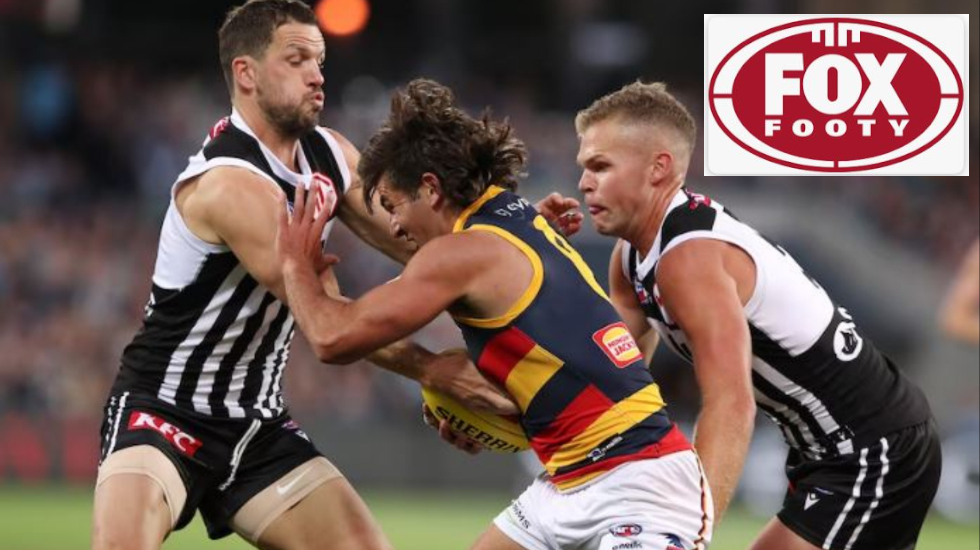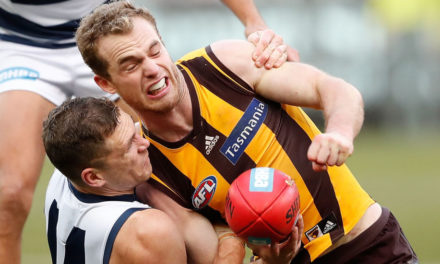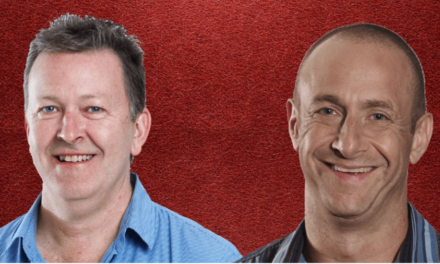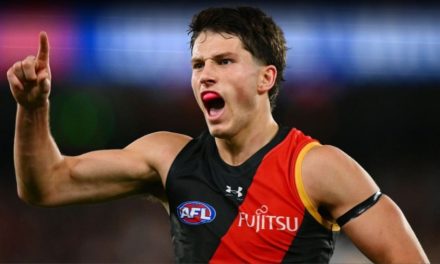Fox Footy expert David King voted on last week’s Showdown Medal from the network’s South Melbourne headquarters.
Football commentary and the styles and standing of this or that individual TV or radio caller has long been a “hot button” topic media outlets have been more than happy to mine for views and clicks.
Recent years, though, have seen another, perhaps more important discussion about AFL commentary largely ignored by the same media, despite increasing frustration from the football public about it.
Games being called from TV or radio studios in states thousands or more kilometres away from the venue has been something of an elephant in the room in mainstream media, at least until last weekend, when that elephant burst spectacularly loose.
That was when Fox Footy had its commentary team for the South Australian “Showdown” between Adelaide and Port Adelaide (with the exception of boundary reporter Mark Ricciuto) based in a South Melbourne studio.
Similar arrangements have been in place for games outside Victoria ever since Covid, but it took the fact that Fox special comments man David King would be voting on the Showdown Medal from South Melbourne off a bank of TV monitors rather than at Adelaide Oval to take that public disquiet from fan forums and social media to mainstream outlets.
Why was that? Well, it’s been hard not to detect a bit of conspiracy of silence going on, a feeling of “there but for the grace of God go we” about it all.
Perhaps different outlets are owned by the same parent companies. Perhaps their journalists, callers and special comments men work for the same outlets being questioned. Perhaps their mates are those in the firing line.
Well, ditto, guys. I know and have enormous respect for King as an analyst, likewise most of those who have had to perform their job from that studio and away from the crowds, atmosphere and traditional visual perspective.
They’re doing their best, and it’s not their fault. But despite the insistences this week from those with a vested interest, their work IS being compromised, and as a consequence, so are you, the viewers and listeners. Most importantly, that is no longer happening because of valid health concerns. It’s just a cost-cutting exercise. And that needs to be called out for what it is.
King makes some terrific observations about how teams play and works hard to back them up with detailed statistical evidence. But his defence of the “studio call” this week on radio didn’t stack up.
Yes, the callers have more screens to observe than the home viewer. But their only screen showing a full ground is by necessity a long shot at greater distance than someone in a venue commentary box. Then there’s the eye adjustment from one screen to another, to another. It’s a far clunkier and unnatural process than what happens organically for a viewer at the ground.
Australian football is played on a field larger than any other code. Play-by-play callers, let alone special comments men, need to be able to see well behind and ahead of where the ball is consistently and closely to make informed calls on why this player or that has found space, again got free from his opponent, etc, etc. Without that access, the commentary is more compromised than it would be for arguably any other sport.
PLEASE HELP US CONTINUE TO THRIVE BY BECOMING AN OFFICIAL FOOTYOLOGY PATRON. JUST CLICK THIS LINK.
So we’re getting more mistakes. More goals called points, and vice-versa. More situations where the “expert” special comments are anything but that because the former player simply doesn’t have enough evidence to do anything other than make an educated guess as to why something happened, so instead just tells us at home what we’ve already established with our own eyes.
And how about, as happened recently in a pre-season game, when there’s a technical issue and picture is lost? Obviously, that is a disaster of epic proportions.
It’s unsatisfactory, those who are involved know it, and will concede that privately. Of course, however, they’re not going to publicly criticise their employers. Will the AFL? Not while it’s still counting its money.
There’s a disingenuity about it, too. We’re never actually told where the commentary teams are, or aren’t. Indeed, in some pre-season games, Fox Footy will extend the ruse to have their callers shot with headsets on at a table to further extend the ruse that they are up close to all the action.
Imagine the sort of scorn these same broadcasters would be heaping on AFL clubs if they attempting to pull those sorts of tricks, or were pursuing their business whilst taking similarly extreme short-cuts? You’d never hear the end of the criticism about lack of professionalism.
So sorry, guys, but I reckon it’s fair for people to conclude that if you’re prepared to tip literally billions of dollars into the AFL’s lap to cover its product, you probably should be prepared also to actually turn up to the venues at which the games are being played.
There’s some high-level irony in the fact that as Channel 7 and Fox have paid increasingly astronomical amounts for the AFL rights, they’ve had to also increasingly scrimp and scrape to find any potential savings here and there.
Seven do it in part by focussing entirely on their live broadcasts, with no football content like panel shows beyond that. At least, however, Seven are now making sure their calling teams are actually at the games.
Fox, meanwhile, are doing it by keeping the bulk of their team Melbourne-based, a relative luxury now considered the set-up in Perth, where play-by-play caller Adam Papalia is actually at games, along with boundary comments men Matthew Pavlich and, last weekend, Will Schofield.
The fact that’s now being held up like some shining example of broadcaster commitment in itself gives you some idea how low expectations have fallen.
These short-cuts were acceptable when health restrictions demanded it. They’re not now. And there’s something particularly distasteful about how those perpetuating them have tried to pull the wool over the football public’s eyes in doing so.
Not for the first time, it’s fair to say footy fans deserve a lot better.
This article first appeared at ESPN.












Is this being done more to not lose staff? If so, would you be comfortable having inferior commentators but having them at the ground.
Couldn’t agree more.
Does the vastness of the Nullarbor do something to the suits in Channel 7 and Fox?
It’s happened more often to Perth games than anywhere else.
Plus,if you’re going to have commentators,keep Taylor away from Collingwood games and Lyon away from Melbourne games.
They add nothing except sanctimonious claptrap about the team they follow.
Is the cupboard really so bare?